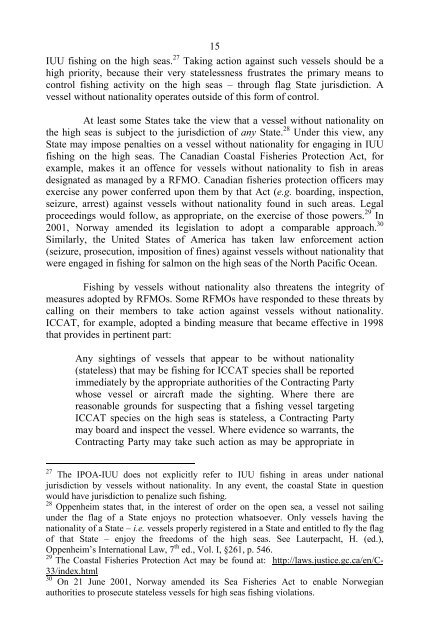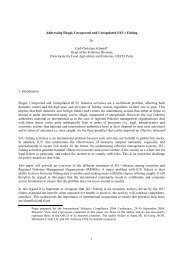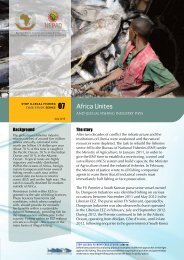Implementation of IPOA/IUU - International MCS Network
Implementation of IPOA/IUU - International MCS Network
Implementation of IPOA/IUU - International MCS Network
You also want an ePaper? Increase the reach of your titles
YUMPU automatically turns print PDFs into web optimized ePapers that Google loves.
15<strong>IUU</strong> fishing on the high seas. 27 Taking action against such vessels should be ahigh priority, because their very statelessness frustrates the primary means tocontrol fishing activity on the high seas – through flag State jurisdiction. Avessel without nationality operates outside <strong>of</strong> this form <strong>of</strong> control.At least some States take the view that a vessel without nationality onthe high seas is subject to the jurisdiction <strong>of</strong> any State. 28 Under this view, anyState may impose penalties on a vessel without nationality for engaging in <strong>IUU</strong>fishing on the high seas. The Canadian Coastal Fisheries Protection Act, forexample, makes it an <strong>of</strong>fence for vessels without nationality to fish in areasdesignated as managed by a RFMO. Canadian fisheries protection <strong>of</strong>ficers mayexercise any power conferred upon them by that Act (e.g. boarding, inspection,seizure, arrest) against vessels without nationality found in such areas. Legalproceedings would follow, as appropriate, on the exercise <strong>of</strong> those powers. 29 In2001, Norway amended its legislation to adopt a comparable approach. 30Similarly, the United States <strong>of</strong> America has taken law enforcement action(seizure, prosecution, imposition <strong>of</strong> fines) against vessels without nationality thatwere engaged in fishing for salmon on the high seas <strong>of</strong> the North Pacific Ocean.Fishing by vessels without nationality also threatens the integrity <strong>of</strong>measures adopted by RFMOs. Some RFMOs have responded to these threats bycalling on their members to take action against vessels without nationality.ICCAT, for example, adopted a binding measure that became effective in 1998that provides in pertinent part:Any sightings <strong>of</strong> vessels that appear to be without nationality(stateless) that may be fishing for ICCAT species shall be reportedimmediately by the appropriate authorities <strong>of</strong> the Contracting Partywhose vessel or aircraft made the sighting. Where there arereasonable grounds for suspecting that a fishing vessel targetingICCAT species on the high seas is stateless, a Contracting Partymay board and inspect the vessel. Where evidence so warrants, theContracting Party may take such action as may be appropriate in27 The <strong>IPOA</strong>-<strong>IUU</strong> does not explicitly refer to <strong>IUU</strong> fishing in areas under nationaljurisdiction by vessels without nationality. In any event, the coastal State in questionwould have jurisdiction to penalize such fishing.28 Oppenheim states that, in the interest <strong>of</strong> order on the open sea, a vessel not sailingunder the flag <strong>of</strong> a State enjoys no protection whatsoever. Only vessels having thenationality <strong>of</strong> a State – i.e. vessels properly registered in a State and entitled to fly the flag<strong>of</strong> that State – enjoy the freedoms <strong>of</strong> the high seas. See Lauterpacht, H. (ed.),Oppenheim’s <strong>International</strong> Law, 7 th ed., Vol. I, §261, p. 546.29 The Coastal Fisheries Protection Act may be found at: http://laws.justice.gc.ca/en/C-33/index.html30 On 21 June 2001, Norway amended its Sea Fisheries Act to enable Norwegianauthorities to prosecute stateless vessels for high seas fishing violations.
















